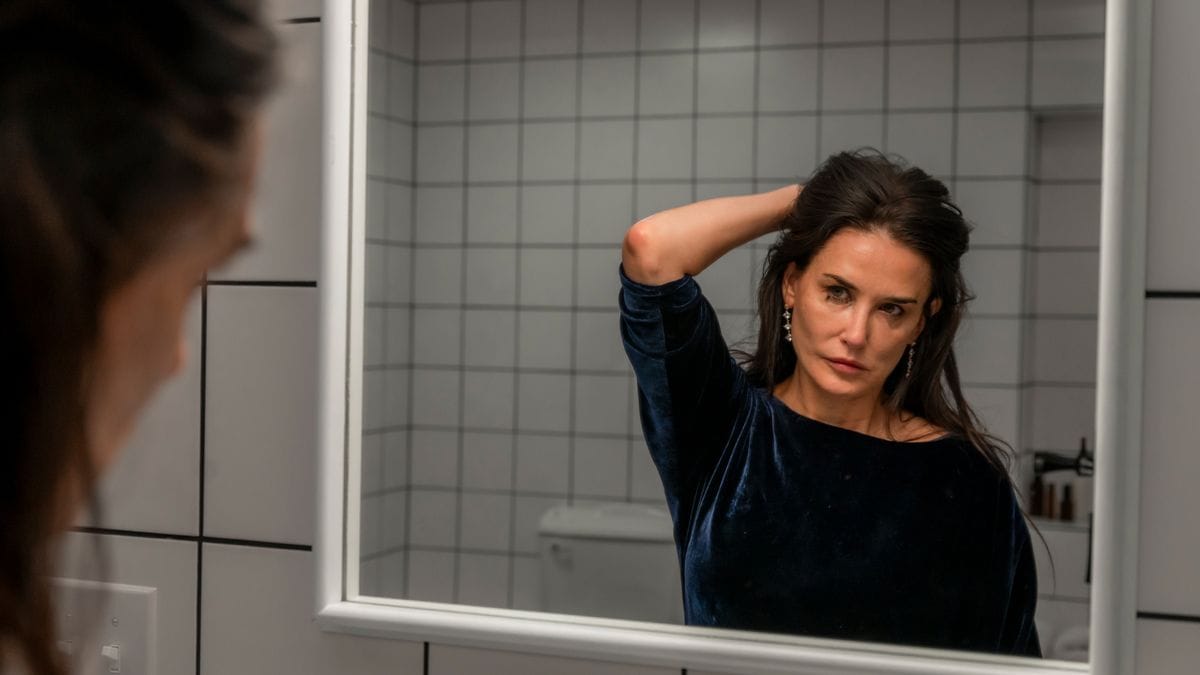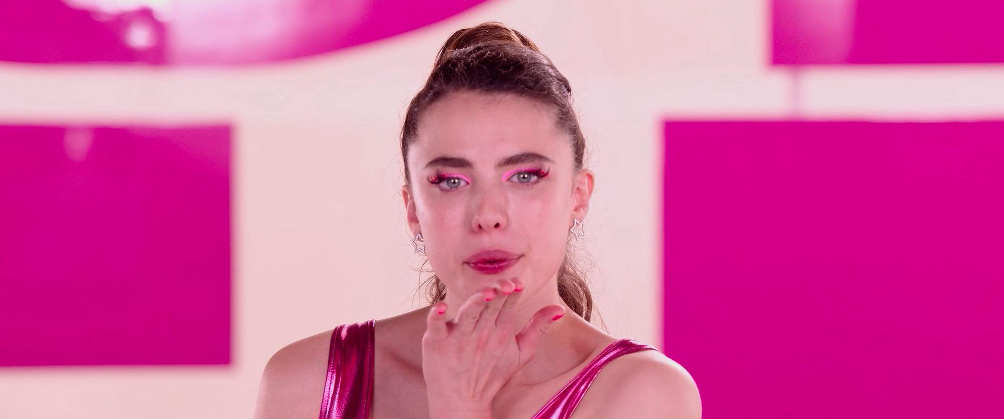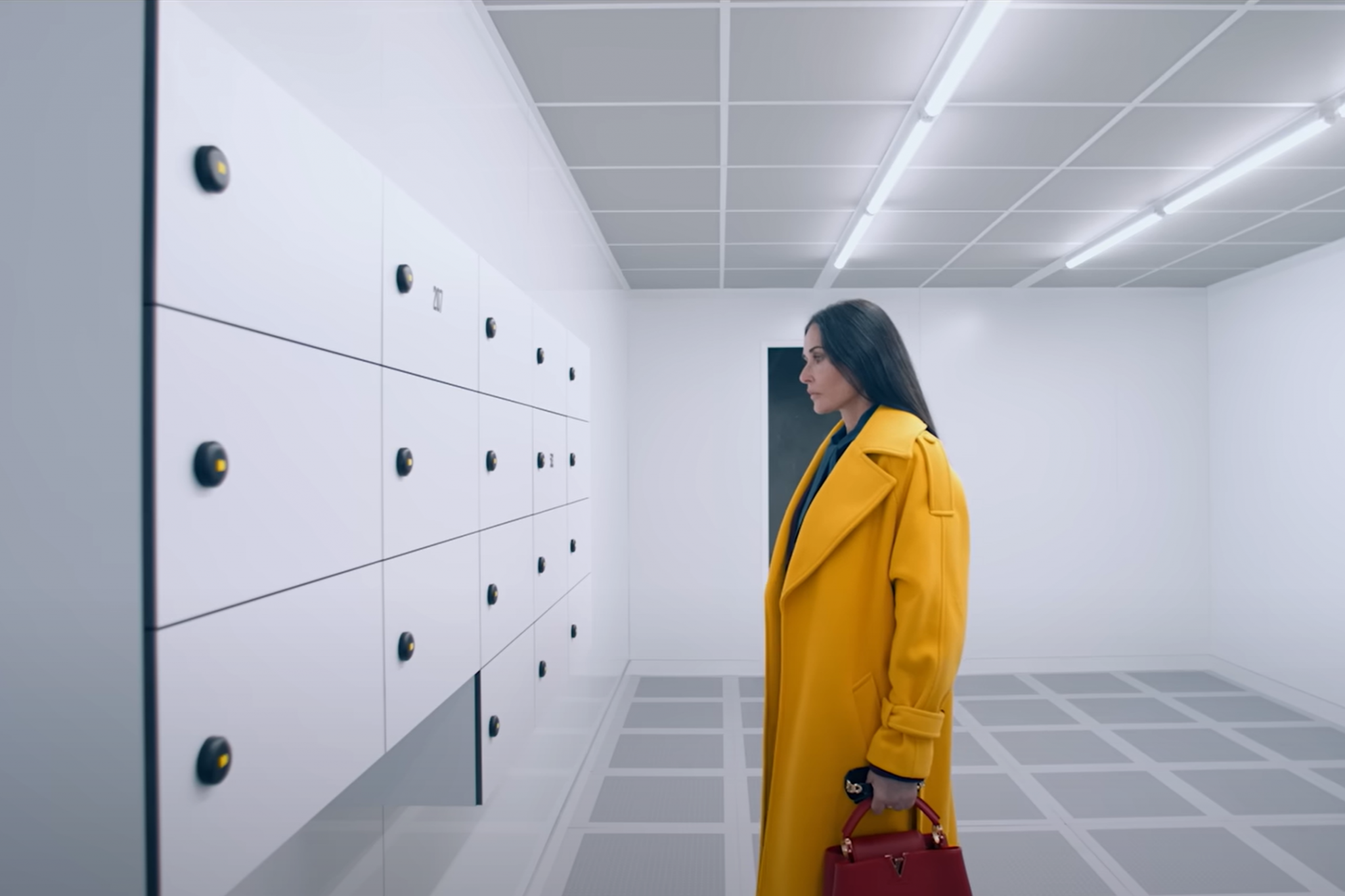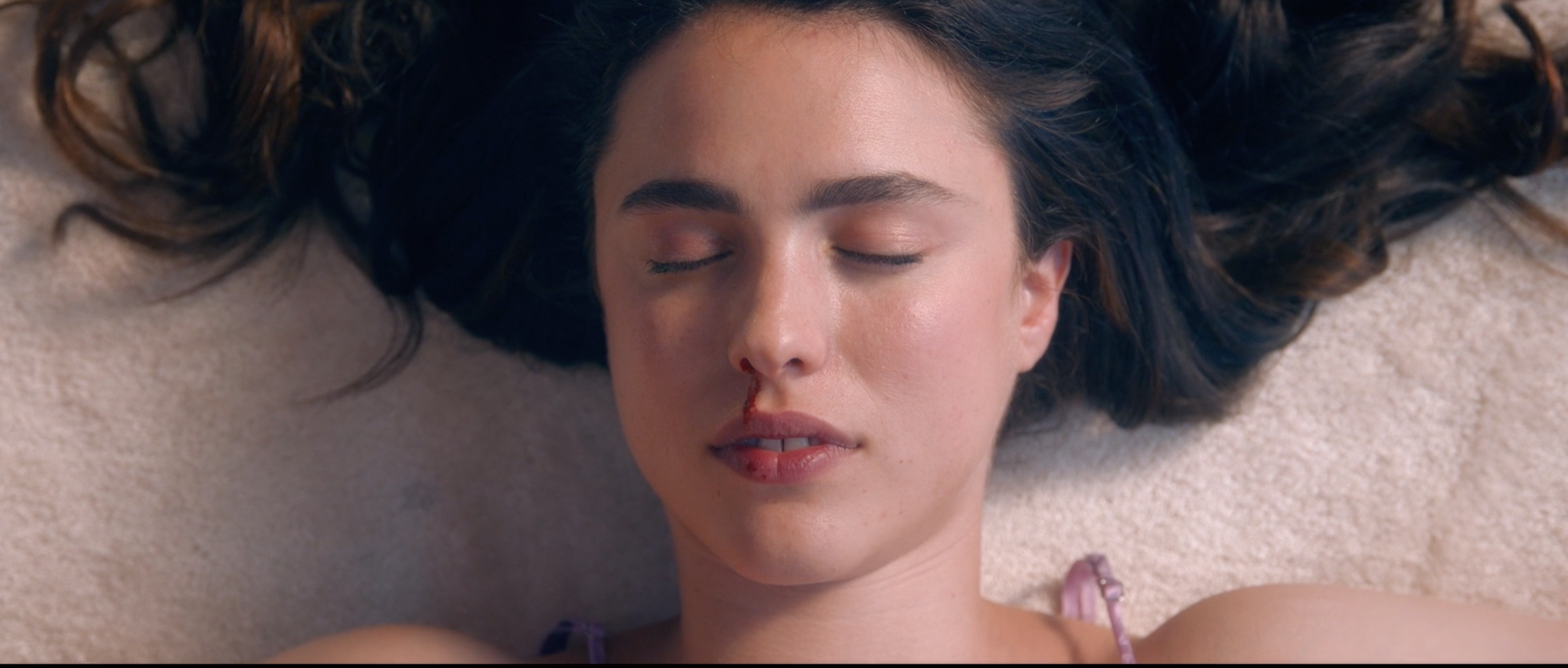I Am Elisabeth Sparkle (and So Are You)
Notes on The Substance and the freedom of letting yourself grow older

So, I finally had a chance to check out The Substance the other night after wanting to see it for a very long time. And honestly, the film is still on my mind in the best, most nauseating way possible.
This is one of those films that’s so visually lush it looks and feels a lot like falling into somebody's fever dream. (Think The Shining’s eerie symmetry meets Black Mirror’s heavy moral hangover.) Every shot drips with color and is soaked in that overripe, candy-coated kind of beauty that makes you think of shiny, pretty plastic things.
This aesthetic bleeds smoothly into the way the characters themselves are styled, as well. For example, Demi Moore’s character, Elisabeth Sparkle, wears a bright mustard-yellow coat when she picks up her weekly “treatments,” like a middle-aged superhero on her way to commit a deeply questionable act of self-love. And even "the substance" itself is an impossibly brilliant shade of neon lime green.
As a result, nothing in this film feels quite real. Even the version of Los Angeles this is set in feels "off" in a way that's hard to put a finger on (although the fact that the film was actually shot overseas probably contributes to that). Kind of like the world and society we live in, especially if you happen to be a woman of a certain age.
And really, that’s what this film is, a two-hour meditation on how surreal and impossible it is to be a woman in a body that refuses to freeze in time. It’s a movie about aging, beauty, and horror, as well as the replacement and decay that can accompany those things.
The Premise (and the Metaphor That Smacks You in the Face)
For those who haven’t seen it, The Substance takes place in a hyper-glossy near-future where a mysterious shadow company sells a product that lets you (literally) grow a younger version of yourself, an idealized, early-twenties duplicate who lives separately and goes out into the world to “live your best life” on your behalf.
Meanwhile, the original you ("the matrix") must remain hidden and weak, dependent on a delicate schedule of intravenous nourishment and control. Every seven days, the two must switch places to maintain the delicate balance between them. While active, the younger self must also inject herself daily with stabilizer fluid extracted directly from the inert body of the matrix.
So, we ultimately have two women who are also "one."
Elisabeth, the older self — a former movie star dismissed by the industry once her face dared to show the passage of time. And Sue, her newly grown younger self — impossibly radiant, impulsive, and brimming with narcissistic hunger.
Together, they are a grotesque inversion of the “glow-up” fantasy. You literally have to harvest from your older self to keep your younger self alive. And the symbolism? About as subtle as a slap with a wet collagen mask. But that's why it works. Because it’s obvious in the way fairytales and fables are obvious.
It's also cautionary.
We live in a culture that not only worships youth but sells it like a drug. The packaging is shinier and slicker than it used to be years ago — “self-care,” “anti-aging,” “wellness." But it’s still the same snake oil inside, just with better marketing and maybe a rose quartz roller thrown in for good measure.

I Am Elisabeth Sparkle (and So Are You)
I am almost exactly the same age as Elisabeth Sparkle. Toward the start of the film, she has her 50th birthday, and I'll be 50 myself on my next one. That said, I completely get where she's coming from.
Even if you never particularly liked being noticed, that creeping awareness that society’s gaze has shifted somewhere else can be unsettling. Especially in light of the fact that you can be more confident, more intelligent, more powerful than ever, and still be treated like you’ve expired.
However, I also remember being my own version of Sue. I remember what it was like to be young enough that people pretty much always turned to look when I walked by. To be considered beautiful in a way that felt effortless, was socially rewarded, but ultimately was also pretty damn hollow. When you are a Sue, you assume attention equals love. But once you’re an Elisabeth, you see that attention for the leash it actually is.
The Horror of Being Seen, Then Unseen
This is what The Substance nails so mercilessly and so very well. Elisabeth's motivation for taking the substance is as much about regaining visibility as it is vanity. It's also about the way women’s worth is tethered to their perceived freshness, one way or the other, as though our youth is the only time we’re allowed to be fully alive.
Elisabeth, once a TV icon, is fired from her Jane Fonda-esque exercise program because she’s “no longer aspirational.” And you can feel the chill in the air when it happens, even as Elisabeth's boss disgusts us all while messily eating a million shrimp as he does it. The words are technically polite, but the meaning absolutely isn’t.
You are no longer consumable.
That’s the real horror at the heart of this story, especially for someone like me — not the blood or the decay, although that's genuinely pretty horrific, but the inevitable erasure. The way the world stops reflecting you back to yourself once you cross the invisible line we all cross sooner or later.
And the younger version of you — the “Sue” you — becomes something you secretly begin to resent. The Substance is what happens when that resentment is given a syringe and a laboratory.
Glamour, Gore, and the Great Lie
Part of what makes this film for me is its tone. It’s horrifying, yes, but it's also gloriously glamorous, darkly funny, and sometimes downright absurd. It’s a carnival mirror that somehow remains intriguing and flattering enough to make sure you keep staring.
The lush cinematography, Elisabeth's yellow coat, the pink pop-star sheen of Sue's spicier take on Elisabeth's old exercise show — it’s all sugarcoating for a poison we already drink daily, whether we want to or not. The movie gives us the aesthetic language of glossy beauty campaigns — soft lighting, gleaming skin, incredibly aspirational women — and then twists it until we choke on it.
We’ve all seen those ads. We’ve all absorbed them. I distinctly remember drooling over those ads as a teenager myself, hoping I'd grow up to be half as compelling as the women in them were. I thought this way even though I knew photo editing and plastic surgery were totally things. We all did.
And somewhere inside, we’ve also probably all wondered:
Would I take this? Would I do that? Would I buy into the lie if it actually worked?
And that’s the part that’s uncomfortable. Because the honest answer isn’t a firm no for the vast majority of us.

Comedy, but Make It Existential
The Substance is funny, too. Not in a “haha” way, or at least not always, but in that dark, uncomfortable way that only fable-fied truth can be.
This film knows how absurd the beauty industry is, and how grotesque the rituals we perform in its name can get. The humor makes it watchable, but it also underscores the honesty underneath. Because aging, for women, is a very confusing tragicomedy. We’re told to “embrace it,” “own it,” and “stay young at heart,” all while being sold $90 serums that promise to delay the inevitable.
The Substance just takes that contradiction and gives it flesh. Literally.
Aging as Rebellion
When you reach a certain age, you eventually realize that existing visibly, confidently, and without apology is its own form of protest. If you're lucky.
For some reason, I never particularly felt the need to chase my younger self. She had her moment, but she didn’t know half of what I know now. She was beautiful, yes, but also deeply insecure, surrounded by opportunists, and very easily manipulated. And while people admired how she looked and envied how much potential she still had, they didn't take her very seriously or care much about who she was as a person — not an experience I miss.
Because so much of the horror of aging isn’t the loss of youth at all. It’s the realization that you wasted so much time worshiping a skin you were always meant to shed, a lesson even Elisabeth starts to learn eventually.
Watching The Substance, I didn’t wish to be a Sue again. I wanted to feed her a sandwich and send her to therapy. Because the truth is, I like who I am now, including the aging face that’s lived and the weathered, world-weary mind. The inner stability that only comes from surviving everything you once thought would destroy you.

The Real Substance
Now, I do appreciate a good skincare routine, but I never particularly liked the idea of plastic surgery or Botox injections, as they seem like several steps too far in a direction that's way too extreme for me. (No shame if you feel differently, though.)
And if "the substance" were a real thing, I wouldn’t take that, either, for similar reasons.
I think that’s what makes this film so brilliant, even in the face of all the gore and grotesque imagery. This isn't graphic horror for shock’s sake. It’s a fairytale, a parable for women who’ve learned that the monster under the bed was always something more sinister and a lot harder to escape than wrinkles. But once you see the lie for what it is, you can stop feeding it, and you can start really living in the body you’ve earned over the years.
So yes, I am Elisabeth Sparkle. But not the version of her who chose to hide behind Sue. I'm the one who defiantly refused to disappear, although thankfully, I won't have to learn her lessons the same way.





